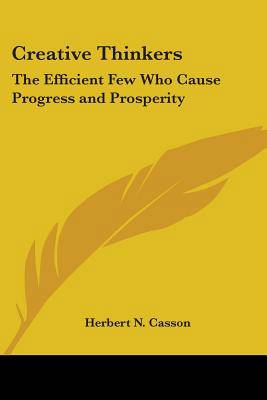
- Afhalen na 1 uur in een winkel met voorraad
- Gratis thuislevering in België vanaf € 30
- Ruim aanbod met 7 miljoen producten
- Afhalen na 1 uur in een winkel met voorraad
- Gratis thuislevering in België vanaf € 30
- Ruim aanbod met 7 miljoen producten
Zoeken
Creative Thinkers
The Efficient Few Who Cause Progress and Prosperity
Herbert N Casson
Paperback | Engels
€ 35,45
+ 70 punten
Uitvoering
Omschrijving
Creative Thinkers: The Efficient Few Who Cause Progress and Prosperity is a book written by Herbert N. Casson that explores the concept of creativity and innovation and how it has contributed to progress and prosperity throughout history. The author argues that it is a small group of creative thinkers who have been responsible for many of the world's greatest achievements, from the invention of the wheel to the development of modern technology.The book is divided into several chapters, each of which focuses on a different aspect of creativity and innovation. The author discusses the characteristics of creative thinkers, the process of innovation, and the role of creativity in various fields such as science, art, and business. He also provides examples of famous creative thinkers and their contributions to society.Throughout the book, Casson emphasizes the importance of creativity in driving progress and prosperity. He argues that without creative thinkers, society would stagnate and fail to advance. He also highlights the challenges that creative thinkers face, such as resistance from established institutions and the need to constantly adapt to changing circumstances.Overall, Creative Thinkers: The Efficient Few Who Cause Progress and Prosperity is a thought-provoking and insightful book that explores the role of creativity in human progress. It is a must-read for anyone interested in innovation, entrepreneurship, and the history of human achievement.1929. An explanation of the rise and fall of business firms and nations. Another volume from England's leading business writer. Casson explains his Formula of Progress is as follows: In the Evolution of the human race upwards, all progress depends upon the production of a comparatively small number of improved individuals, who are superior to the mass in knowledge, skill or character, and who, by reason of their superior powers, render a new service the mass of people among whom they live. This is the law of the efficient few. It points out that Progress depends upon the differentiation of a few higher quality samples of human beings. The mass of people are never progressive. The mass of people can destroy, but they can never create. They can pull down, but they cannot build up. All the constructive work in the world is done by a few individuals, and usually in spite of the active opposition of the mass. See other titles by this author available from Kessinger Publishing.This scarce antiquarian book is a facsimile reprint of the old original and may contain some imperfections such as library marks and notations. Because we believe this work is culturally important, we have made it available as part of our commitment for protecting, preserving, and promoting the world's literature in affordable, high quality, modern editions, that are true to their original work.
Specificaties
Betrokkenen
- Auteur(s):
- Uitgeverij:
Inhoud
- Aantal bladzijden:
- 200
- Taal:
- Engels
Eigenschappen
- Productcode (EAN):
- 9781417910854
- Verschijningsdatum:
- 11/01/2005
- Uitvoering:
- Paperback
- Formaat:
- Trade paperback (VS)
- Afmetingen:
- 152 mm x 229 mm
- Gewicht:
- 299 g

Alleen bij Standaard Boekhandel
+ 70 punten op je klantenkaart van Standaard Boekhandel
Beoordelingen
We publiceren alleen reviews die voldoen aan de voorwaarden voor reviews. Bekijk onze voorwaarden voor reviews.











